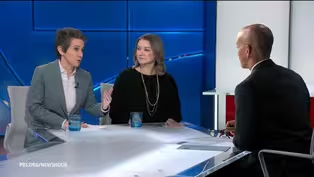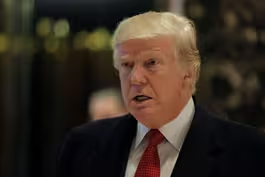
How CEOs are trying to gain favor with Trump
Clip: 12/16/2024 | 5m 40sVideo has Closed Captions
How CEOs of major companies are trying to gain favor with Trump
During a press conference Monday, President-elect Trump discussed how CEOs and business leaders from Wall Street to Silicon Valley are rushing to meet with him and build personal relationships in the weeks before his inauguration. Trump took note of just how different a tone it has been compared to 2016. To break down why, Geoff Bennett spoke with Brian Schwartz of The Wall Street Journal.
Problems playing video? | Closed Captioning Feedback
Problems playing video? | Closed Captioning Feedback
Major corporate funding for the PBS News Hour is provided by BDO, BNSF, Consumer Cellular, American Cruise Lines, and Raymond James. Funding for the PBS NewsHour Weekend is provided by...

How CEOs are trying to gain favor with Trump
Clip: 12/16/2024 | 5m 40sVideo has Closed Captions
During a press conference Monday, President-elect Trump discussed how CEOs and business leaders from Wall Street to Silicon Valley are rushing to meet with him and build personal relationships in the weeks before his inauguration. Trump took note of just how different a tone it has been compared to 2016. To break down why, Geoff Bennett spoke with Brian Schwartz of The Wall Street Journal.
Problems playing video? | Closed Captioning Feedback
How to Watch PBS News Hour
PBS News Hour is available to stream on pbs.org and the free PBS App, available on iPhone, Apple TV, Android TV, Android smartphones, Amazon Fire TV, Amazon Fire Tablet, Roku, Samsung Smart TV, and Vizio.
Providing Support for PBS.org
Learn Moreabout PBS online sponsorshipGEOFF BENNETT: During his press conference today, president-elect Trump also discussed how CEOs and business leaders from Wall Street to Silicon Valley are rushing to meet with him and build personal relationships in the weeks before his inauguration.
Mr. Trump took note of just how different a tone it has been compared to 2016.
DONALD TRUMP, Former President of the United States (R) and Current U.S. President-Elect: The first term, everybody was fighting me.
In this term, everybody wants to be my friend.
People want to get along with me this time.
Well, they have gone through four years.
And it wasn't easy for me, but it wasn't easy for them either.
And that's a great thing, though.
Getting along is a great thing.
GEOFF BENNETT: To break down why, we're joined now by Brian Schwartz, White House economic policy reporter at The Wall Street Journal.
Thanks for being with us.
BRIAN SCHWARTZ, White House Economic Policy Reporter, The Wall Street Journal: Thanks for having me.
GEOFF BENNETT: So you actually wrote about this for The Wall Street Journal in a piece with the headline "The Week CEOs Bent the Knee to Trump."
Whether it's Apple CEO Tim Cook, Mark Zuckerberg of Facebook, Amazon's Jeff Bezos, what are these CEOs hoping to gain or perhaps trying to prevent?
BRIAN SCHWARTZ: Well, it's those few and many more have been reaching out and engaging with Donald Trump since his Election Day victory, along with his advisers, right?
And most of it feels like this kind of first move to cozy up to Trump as he prepares to be sworn in as president.
But when you talk to people privately about this, many executives have concerns over Trump's proposed tariff policies.
He's been talking about that throughout the campaign.
He talked about that at the press conference today.
And it's this idea that he's going to slap tariffs on goods coming from China, possibly from Mexico and Canada.
And, keep in mind, many of these CEOs either do business in China or they know people or close to business leaders who do.
And I think that's pretty notable.
So my sense on this is just this is just the beginning of kind of an engagement with Trump directly, not necessarily entirely with his advisers, but there are some meetings going with his advisers as well, to start the process of trying to push back on some of these tariffs that are likely to come.
GEOFF BENNETT: What is fundamentally different about this kind of outreach that we're seeing now, these CEOs to Donald Trump, as compared to CEOs with presidents past?
BRIAN SCHWARTZ: Well, you could compare it directly with President Joe Biden.
You just didn't see this.
I mean, let's be very clear about it.
Yes, he had various meetings that were all out in the open with CEOs.
You name them, Jamie Dimon, and big bank CEOs would meet with Joe Biden, and all that's out there.
But they did not have this much of a close relationship with the president.
It just didn't happen that way.
And with Donald Trump, that's been a different story since 2016.
These executives have had direct access at times to the White House.
You mentioned somebody like Tim Cook.
I mean, after the first election in 2016, Cook was in regular contact with Trump.
The same thing now recently, as we reported, with Jeff Bezos.
He's been in contact with Trump and people close to him like Jared Kushner.
So the reality is, is this type of system was just not in place with Joe Biden, and it is with Trump as he starts to head to the White House.
GEOFF BENNETT: And your recent reporting looks at the limits to that kind of influence.
Tell me more about that.
BRIAN SCHWARTZ: Well, when you look at the tariff situation, for instance, there's been for weeks this effort to try to talk with Trump or talk with Trump's team on how to kind of maneuver the president-elect when it comes to tariffs.
And the message from advisers to corporate leaders or their consultants has been really clear.
Right now, as of today, Trump's not getting off this track of using tariffs, at least from a negotiating or a threat perspective, right?
We don't know exactly if he's going to follow through with every single tariff threat that he's put out there.
But Trump and his team have made it extremely clear that, right now, tariffs are going to be some form of a policy tool in this next administration.
And for corporate leaders, that could be a problem, because, if you're looking for some sort of exemption from these tariffs, and there were exemptions in Trump 1.0 for certain companies, there are still question marks as to exactly how you're going to approach this administration and make the impact that you're looking to have when it becomes to avoiding the impact of those tariffs.
GEOFF BENNETT: And, Brian, the president-elect has also vowed to expedite federal permitting for companies that invest at least $1 billion in the U.S. And, today, he announced the Japanese company SoftBank was making a $100 billion investment in a number of U.S. projects.
What are the implications and possible complications of an approach like that?
BRIAN SCHWARTZ: Yes, I listen, I saw that, and I was pretty -- I was surprised when I saw him put that out on TRUTH Social, because it seems like that would have to be a move that it would have to be approved by Congress.
I understand Republicans control Congress, but that would have to shift the type of approval process we're alluding to here to a degree that I don't think is -- can be done by purely executive order.
And it's interesting.
We have some reporting where Doug Burgum, who's very close to a bunch of oil CEOs and he's the nominee to be interior secretary, when he saw that while with his team, he privately acknowledged that he was really impressed with that decision.
And I think -- in that announcement.
But there are still questions as to whether Trump is going to be able to move ahead with this and enact such a change to the approval process, particularly around land grants and around oil and energy regulations surrounding those types of decisions.
GEOFF BENNETT: Yes, advocacy groups see this as making an end run around environmental protections.
Brian Schwartz of The Wall Street Journal, thanks so much for being with us.
BRIAN SCHWARTZ: Thank you.
Arizona farmers forced to adapt as water source dries up
Video has Closed Captions
Clip: 12/16/2024 | 6m 25s | Arizona farmers forced to adapt as main water source dries up (6m 25s)
City home to Syria's uprising celebrates life without Assad
Video has Closed Captions
Clip: 12/16/2024 | 6m 53s | City that fostered Syria's uprising celebrates life without Assad (6m 53s)
Syrian leaders face decisions as they chart path for country
Video has Closed Captions
Clip: 12/16/2024 | 4m 54s | Syria's rebel leaders face critical decisions as they chart new path for the country (4m 54s)
Tamara Keith and Amy Walter on Trump preparing for Day 1
Video has Closed Captions
Clip: 12/16/2024 | 10m 17s | Tamara Keith and Amy Walter on how Trump's team is preparing for his Day 1 agenda (10m 17s)
Trump settlement with ABC raises press freedom concerns
Video has Closed Captions
Clip: 12/16/2024 | 7m 22s | ABC News settlement with Trump raises concerns about press freedom in his 2nd term (7m 22s)
Wisconsin shooting leaves community shaken by gun violence
Video has Closed Captions
Clip: 12/16/2024 | 2m 52s | Wisconsin school shooting leaves another American community shaken by gun violence (2m 52s)
Providing Support for PBS.org
Learn Moreabout PBS online sponsorship
- News and Public Affairs

FRONTLINE is investigative journalism that questions, explains and changes our world.

- News and Public Affairs

Amanpour and Company features conversations with leaders and decision makers.












Support for PBS provided by:
Major corporate funding for the PBS News Hour is provided by BDO, BNSF, Consumer Cellular, American Cruise Lines, and Raymond James. Funding for the PBS NewsHour Weekend is provided by...





